Sweden has taken its place among the member states of the North Atlantic Treaty Organization (NATO), transitioning from a historically non-aligned stance to full participation in the transatlantic alliance. This strategic realignment comes as a response to the evolving security landscape in Europe, underscored by heightened regional tensions and security threats.
Sweden’s accession to NATO aligns with similar moves by Finland, reflecting a coordinated Nordic approach to defense amidst a challenging geopolitical environment. The accession received widespread support from existing NATO members, signaling a shared interest in strengthening collaborative defense efforts.
Joining NATO, Sweden now adheres to the principle that an assault on one ally is treated as an assault on the collective, a keystone of the alliance’s mutual defense doctrine. This principle is critical in fostering a united front where member nations stand in solidarity against potential threats, fundamentally rooted in the alliance’s founding treaty.
The Swedish Parliament and public engaged in rigorous discussions on the prospect of NATO membership, culminating in a national consensus to pursue a path towards joining the alliance. The debates and reflections within Sweden exemplified the depth of democratic engagement and the seriousness with which the nation approached this strategic pivot.
The addition of Sweden to the NATO alliance has drawn a spectrum of international reactions. Advocates argue that Sweden enhances NATO’s defense capabilities with its advanced military technology and firm democratic governance. Meanwhile, dissenting voices have cautioned that the expansion might exacerbate global divisions, particularly with countries viewing the alliance with apprehension.
Post-membership, Sweden is expected to augment its defense mechanisms and enhance cooperative efforts with fellow NATO countries. This includes joint military exercises, strategic planning, and information sharing, fortifying the collective defense infrastructure.
Sweden’s commitment to NATO is couched in an assurance that its membership seeks to bolster regional stability and security, not to provoke hostilities. This sentiment is shared by NATO leadership, which maintains that the alliance’s enlargement policy is a testament to the principle of open doors – a standing invitation to European democracies willing to undertake the obligations and responsibilities of membership.
In essence, Sweden’s entry into NATO signifies a pivotal turn in its defense policy and reshapes the security dialogue in Europe. As the latest addition to NATO, Sweden pledges to uphold the shared values of collective defense and peace preservation in the North Atlantic area. This expansion of NATO reflects the alliance’s adaptive nature in responding to contemporary security demands, marking a new chapter for European defense and international relations alike.
The integration of Sweden into the fabric of NATO is more than a ceremonial inclusion; it is a proactive step towards ensuring lasting peace and stability in an unpredictable global arena, with implications that reach well beyond the immediate region.
Image is licensed under the Creative Commons Attribution-Share Alike 4.0 International license and was created by Justin Kunimune.









